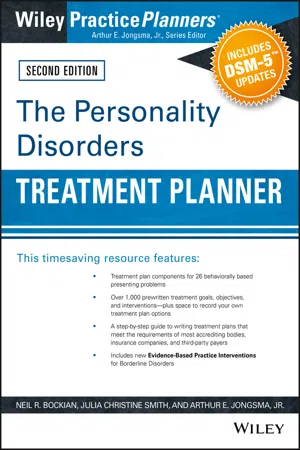
The Personality Disorders Treatment Planner: Includes DSM-5 Updates
- English
- ePUB (mobile friendly)
- Available on iOS & Android
The Personality Disorders Treatment Planner: Includes DSM-5 Updates
About this book
Approaching personality disorders with evidence-based treatment plans
The Personality Disorders Treatment Planner, 2 nd Edition is fully updated to meet the changing needs of the mental healthcare field. A time-saver for psychologists, counselors, social workers, psychiatrists, and other mental health professionals, this new edition offers the tools you need to develop formal treatment plans that meet the demands of HMOs, managed care companies, third-party payors, and state and federal agencies. Organized around twenty-six presenting problems, the easy-to-use format and over 1, 000 prewritten symptom descriptions, treatment goals, objectives, and interventions makes the task of developing an evidence-based treatment plan more efficient than ever. The treatment of mental health disorders is rapidly evolving, and new evidence-based protocols are being adopted by federal and state organizations. You are now required to closely monitor patient progress, and you may feel pressure to stick to standardized care and reporting procedures; however, you can only do so if you have access to the latest in evidence-based treatment plans.
- Updated with new and revised evidence-based Objectives and Interventions
- Integrated DSM-5 diagnostic labels and ICD-10 codes into the Diagnostic Suggestions section of each chapter
- Many more suggested homework assignments integrated into the Interventions
- An Appendix demonstrates the use of the personality disorders Proposed Dimensional System of DSM-5.
- Expanded and updated self-help book list in the Bibliotherapy Appendix
- Revised, expanded and updated Professional Reference Appendix
- New Recovery Model Appendix D listing Objectives and Interventions allowing the integration of a recovery model orientation into treatment plans
Frequently asked questions
- Essential is ideal for learners and professionals who enjoy exploring a wide range of subjects. Access the Essential Library with 800,000+ trusted titles and best-sellers across business, personal growth, and the humanities. Includes unlimited reading time and Standard Read Aloud voice.
- Complete: Perfect for advanced learners and researchers needing full, unrestricted access. Unlock 1.4M+ books across hundreds of subjects, including academic and specialized titles. The Complete Plan also includes advanced features like Premium Read Aloud and Research Assistant.
Please note we cannot support devices running on iOS 13 and Android 7 or earlier. Learn more about using the app.
Information
Appendix A
PROPOSED DIMENSIONS FOR PERSONALITY DISORDERS APPLIED TO PRESENTING PROBLEM BEHAVIORAL DEFINITIONS (SYMPTOMS) FOR SELECTED CHAPTERS
ANTISOCIAL
Behavioral Definitions
- Failure to conform to social norms with respect to lawful behaviors as indicated by repeatedly performing acts that are grounds for arrest
- Impaired Domain(s) of Personality Functioning:
- Self-Direction: Absence of prosocial internal standards, associated with failure to conform to lawful, normative ethical behaviors despite possible consequences
- Pathological Personality Trait(s):
- Disinhibition: Risk Taking
- Impaired Domain(s) of Personality Functioning:
- Deception as indicated by repeatedly lying, use of aliases, or conning others for personal profit
- Impaired Domain(s) of Personality Functioning:
- Self-Direction: Absence of prosocial internal standards, associated with failure to conform to lawful, normative ethical behaviors despite possible consequences
- Intimacy: Exploitation as a primary means of relating to others, including by deceit and coercion
- Pathological Personality Trait(s):
- Antagonism: Deceitfulness
- Impaired Domain(s) of Personality Functioning:
- Impulsivity or failure to plan ahead
- Impaired Domain(s) of Personality Functioning:
- Self-Direction: Goal setting ability compromised as a result of impulsive tendencies
- Pathological Personality Trait(s):
- Disinhibition: Impulsivity
- Impaired Domain(s) of Personality Functioning:
- Irritability and aggressiveness, as indicated by repeated physical fights or assaults
- Impaired Domain(s) of Personality Functioning:
- Identity: Self-esteem derived from power; potential threats to ego provoke strong emotions such as anger, rage, shame
- Pathological Personality Trait(s):
- Antagonism: Hostility
- Disinhibition: Impulsivity
- Impaired Domain(s) of Personality Functioning:
- Reckless disregard for safety of self or others
- Impaired Domain(s) of Personality Functioning:
- Empathy: Lack of concern for feelings, needs, suffering of others; lack of remorse after hurting or mistreating another
- Pathological Personality Trait(s):
- Antagonism: Callousness
- Impaired Domain(s) of Personality Functioning:
- Consistent irresponsibility, as indicated by repeated failure to sustain consistent work behavior or honor financial obligations
- Impaired Domain(s) of Personality Functioning:
- Self-Direction: Absence of prosocial internal standards, associated with failure to conform to lawful, normative ethical behaviors despite possible consequences
- Pathological Personality Trait(s):
- Disinhibition: Irresponsibility
- Impaired Domain(s) of Personality Functioning:
- Lack of remorse, as indicated by being indifferent to or rationalizing having hurt, mistreated, or stolen from another
- Impaired Domain(s) of Personality Functioning:
- Empathy: Lack of concern for feelings, needs, suffering of others; lack of remorse after hurting or mistreating another
- Pathological Personality Trait(s):
- Antagonism: Callousness
- Impaired Domain(s) of Personality Functioning:
AVOIDANT
Behavioral Definitions
- Avoids others due to fears of criticism, disapproval, or rejection
- Impaired Domain(s) of Personality Functioning:
- Identity: Has vulnerable self-esteem controlled by exaggerated concern about external evaluation
- Intimacy: Feelings about intimate involvement with others alternate be...
- Impaired Domain(s) of Personality Functioning:
Table of contents
- Cover
- Series Page
- Title Page
- Copyright
- Table of Contents
- Dedication
- Foreword
- Acknowledgments
- INTRODUCTION
- SAMPLE TREATMENT PLAN
- AGGRESSIVE/SADISTIC
- ANTISOCIAL
- ANTISOCIAL—MALEVOLENT
- AVOIDANT
- AVOIDANT—CONFLICTED
- AVOIDANT—HYPERSENSITIVE
- BORDERLINE
- BORDERLINE—PETULANT
- BORDERLINE—SELF-DESTRUCTIVE
- DEPENDENT
- DEPENDENT—SELFLESS
- DEPRESSIVE
- HISTRIONIC
- HISTRIONIC—DISINGENUOUS
- INTROPUNITIVE/GUILTY
- NARCISSISTIC
- NARCISSISTIC—COMPENSATORY
- NARCISSISTIC—UNPRINCIPLED
- OBSESSIVE-COMPULSIVE
- OBSESSIVE-COMPULSIVE—BEDEVILED
- PARANOID
- PARANOID—FANATIC
- PARANOID—MALIGNANT
- PASSIVE-AGGRESSIVE (NEGATIVISTIC)
- SCHIZOID
- SCHIZOTYPAL
- APPENDIX A: PROPOSED DIMENSIONS FOR PERSONALITY DISORDERS APPLIED TO PRESENTING PROBLEM BEHAVIORAL DEFINITIONS (SYMPTOMS) FOR SELECTED CHAPTERS
- APPENDIX B: BIBLIOTHERAPY/SELF-HELP REFERENCES
- APPENDIX C: PROFESSIONAL REFERENCES
- APPENDIX D: RECOVERY MODEL OBJECTIVES AND INTERVENTIONS
- End User License Agreement